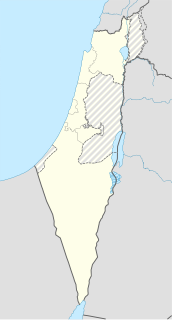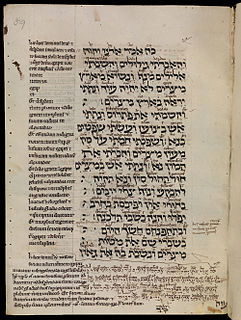Related Research Articles

Heinrich Friedrich Wilhelm Gesenius was a German orientalist, lexicographer, Christian Hebraist, Lutheran theologian, Biblical scholar and critic.

The Cave of Adullam was originally a stronghold referred to in the Old Testament, near the town of Adullam, where future King David sought refuge from King Saul.

Biblical Aramaic is the form of Aramaic that is used in the books of Daniel and Ezra in the Hebrew Bible. It should not be confused with the Aramaic paraphrases, explanations and expansions of the Hebrew scriptures, which are known as targumim.

Samuel Prideaux Tregelles was an English biblical scholar, lexicographer, Christian Hebraist, textual critic, and theologian.

Kabzeel is a Hebrew Bible place name. It was the most remote city of Judah; located in southern Judah on the border of Edom (Idumaea). The location is tentatively identified with Khirbet Hora, about 10 km ENE of Beer-sheba. Kabzeel was the birthplace of Benaiah, one of David's chief warriors. Following the Exile, it was resettled under the name Jekabzeel.
Isaiah 24 is the 24th chapter of the Book of Isaiah in the Hebrew Bible or the Old Testament of the Christian Bible. This book contains the prophecies attributed to the prophet Isaiah, and is one of the Books of the Prophets. Chapters 24-27 of Isaiah constitute one unit of prophecy sometimes called the "Isaiah Apocalypse". Chapter 24 contains the prophecy on the destruction of Judah for its defilements and transgressions, while a remnant will praise God, and God, by his judgments on his people and their enemies, will advance his kingdom.

Ezekiel 37 is the thirty-seventh chapter of the Book of Ezekiel in the Hebrew Bible or the Old Testament of the Christian Bible. This book contains the prophecies attributed to the prophet/priest Ezekiel, and is one of the Nevi'im (Prophets). This chapter contains a vision of the resurrection of dry bones, widely known as the vision of the "valley of dry bones", in which Ezekiel at last assures the captives in Babylon that they will return from exile.

Ezekiel 8 is the eighth chapter of the Book of Ezekiel in the Hebrew Bible or the Old Testament of the Christian Bible. This book contains the prophecies attributed to the prophet/priest Ezekiel, and is one of the Books of the Prophets. In this chapter, Ezekiel condemns the idolatry which he sees in the Jerusalem Temple. His vision of the defiled temple continues as far as Ezekiel 11:25.

Ezekiel 9 is the ninth chapter of the Book of Ezekiel in the Hebrew Bible or the Old Testament of the Christian Bible. This book contains the prophecies attributed to the prophet/priest Ezekiel, and is one of the Books of the Prophets. This chapter, sub-titled "The Wicked Are Slain" in the New King James Version, contains God's "judgment on the idolaters" who defiled the temple in Jerusalem. Ezekiel's vision of the defiled temple continues as far as Ezekiel 11:25.

Ezekiel 12 is the twelfth chapter of the Book of Ezekiel in the Hebrew Bible or the Old Testament of the Christian Bible. This book contains the prophecies attributed to the prophet/priest Ezekiel, and is one of the Books of the Prophets. In this chapter, Ezekiel undertakes the "mime of the emigrant" and the chapter concludes with condemnation of some "popular proverbs".

Ezekiel 16 is the sixteenth chapter of the Book of Ezekiel in the Hebrew Bible or the Old Testament of the Christian Bible. This book contains prophecies attributed to the prophet/priest Ezekiel, and is one of the Books of the Prophets. Biblical scholar R. E. Clements calls this chapter "an Old Testament parable of the prodigal daughter", describing a shocking illustration of ungrateful Jerusalem in contrast to God's enduring love to her. This chapter is often linked to Ezekiel 23, which deals with two daughters, symbolizing the Kingdoms of Israel and Judah.

Ezekiel 17 is the seventeenth chapter of the Book of Ezekiel in the Hebrew Bible or the Old Testament of the Christian Bible. This book contains the prophecies attributed to the prophet/priest Ezekiel, and is one of the Books of the Prophets. This chapter tells, and then interprets, the riddle of the great eagle.

Ezekiel 18 is the eighteenth chapter of the Book of Ezekiel in the Hebrew Bible or the Old Testament of the Christian Bible. This book contains the prophecies attributed to the prophet/priest Ezekiel, and is one of the Books of the Prophets. In this chapter, Ezekiel "departs from the Priestly belief in the transgenerational consequences of sin and stresses the moral responsibility of [each] generation".

Ezekiel 19 is the nineteenth chapter of the Book of Ezekiel in the Hebrew Bible or the Old Testament of the Christian Bible. This book contains the prophecies attributed to the prophet/priest Ezekiel, and is one of the Books of the Prophets. This chapter contains a kinah or lamentation for the rulers of Israel. Two princes are lamented, one captured and carried to Egypt, i.e. Jehoahaz, son and successor of Josiah, and another carried to Babylon, who must be Jehoiachin.

Ezekiel 21 is the twenty-first chapter of the Book of Ezekiel in the Hebrew Bible or the Old Testament of the Christian Bible. This book contains the prophecies attributed to the prophet/priest Ezekiel, and is one of the Books of the Prophets. In chapters 20 to 24 there are "further predictions regarding the fall of Jerusalem", and this chapter also includes a prophecy against the Ammonites.

Ezekiel 27 is the twenty-seventh chapter of the Book of Ezekiel in the Hebrew Bible or the Old Testament of the Christian Bible. This book contains the prophecies attributed to the prophet/priest Ezekiel, and is one of the Books of the Prophets. This chapter contains a lamentation for the fallen city of Tyre.

Ezekiel 33 is the thirty-third chapter of the Book of Ezekiel in the Hebrew Bible or the Old Testament of the Christian Bible. This book contains the prophecies attributed to the prophet/priest Ezekiel, and is one of the Books of the Prophets. This chapter opens the third and final section of the book, in which God's future blessings on Israel are proclaimed. A "complex interweaving of themes imported from the first twenty-four chapters of the book" is concerned with the concept of responsibility, including Ezekiel's own responsibility as a "watchman", and "the people's responsibility for their own moral and religious choices".

Ezekiel 34 is the thirty-fourth chapter of the Book of Ezekiel in the Hebrew Bible or the Old Testament of the Christian Bible. This book contains the prophecies attributed to the prophet/priest Ezekiel, and is one of the Books of the Prophets. In this chapter, Ezekiel prophecies against the "irresponsible shepherds" of Israel and states that God will instead seek out God's sheep and become their "true shepherd". The Jerusalem Bible notes the continuity of this theme, occurring in Jeremiah 23:1-6, here in Ezekiel, and later resumed in Zechariah 11:4-17, as well as in the New Testament.

Ezekiel 35 is the thirty-fifth chapter of the Book of Ezekiel in the Hebrew Bible or the Old Testament of the Christian Bible. This book contains the prophecies attributed to the prophet/priest Ezekiel, and is one of the Books of the Prophets. This chapter contains a prophecy against Mount Seir in Edom, to the south of Judah. Biblical commentator Susan Galambush pairs it with an oracle promising "restoration to the mountains of Israel" in the following chapter.

Ezekiel 36 is the thirty-sixth chapter of the Book of Ezekiel in the Hebrew Bible or the Old Testament of the Christian Bible. This book contains the prophecies attributed to the prophet/priest Ezekiel, and is one of the Books of the Prophets. This chapter contains two prophecies, one conveying "hope for the mountains of Israel" and one declaring that Israel's restoration is assured. Biblical commentator Susan Galambush pairs the first of these with an oracle condemning Mount Seir in Edom in the previous chapter.
References
![]() This article incorporates text from a publication now in the public domain : Easton, Matthew George (1897). Easton's Bible Dictionary (New and revised ed.). T. Nelson and Sons.Missing or empty
This article incorporates text from a publication now in the public domain : Easton, Matthew George (1897). Easton's Bible Dictionary (New and revised ed.). T. Nelson and Sons.Missing or empty |title= (help)
- ↑ Easton, Matthew George (1897). "Baale of Judah." Easton's Bible Dictionary (New and revised ed.). T. Nelson and Sons.
- ↑ Gesenius, Wilhelm, translated by Samuel Prideaux Tregelles. A Hebrew and Chaldee Lexicon of the Old Testament Scriptures (1857), entry Beth Ayin Lamed.
- ↑ 2 Samuel 6:2
- ↑ 1 Chronicles 13:6
- ↑ Gesenius, Wilhelm, translated by Samuel Prideaux Tregelles. A Hebrew and Chaldee Lexicon of the Old Testament Scriptures (1857), entry Beth Ayin Lamed.